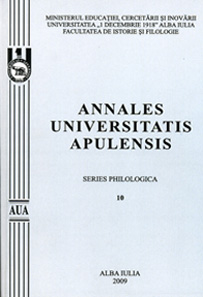A Possible Conversational Analysis Grid from the Perspective of Slang Applied to “O, Brother, Where Art Thou”
A Possible Conversational Analysis Grid from the Perspective of Slang Applied to “O, Brother, Where Art Thou”
Author(s): Gabriel-Dan BărbuleţSubject(s): Language and Literature Studies
Published by: Universitatea »1 Decembrie 1918« Alba Iulia
Keywords: conversational analysis; slang; politeness strategies; context; power relation
Summary/Abstract: My paper deals with the way slang is used in movies, with a particular focus on “O, Brother, Where Art Thou?” from the perspective of issues related to the literature that focuses on Pragmatics, mainly on Conversational Analysis elements. My work is structured according to the following landmarks: Summary of the movie, Context of the slang expression that is to be analyzed, The slang expression(s) – divided into the original quote with slang and the meaning, The Slang usage and Conversational Analysis & Power & Politeness Strategies. It is natural that my analysis should start from a general presentation of the movie. This is due to the fact that one may find it utterly difficult to understand the general context of the movie unless one has a frame where he/she may place the body of language that is to be analyzed and focused on. Moreover, apart from the summary, one also needs to be given the context of the slang expression in order to understand it. A very important issue in my analysis is represented by the original quote with slang and its meaning. Further on, I have tried to explain why the conversational interactans used slang in the particular situation, what made them resort to slang and not to informal, formal or standard language. Thus, I have started from the premise that people use slang either to induce friendliness or intimacy. They might be also determined to use slang in order to show that they belong to the same group. Slang also serves social functions, setting and proclaiming social boundaries. It also permits speakers to assert membership of identity. It also rejects the power dimensions associated with formal language. More than that, sometimes the very situation requires the usage of slang as the conversationalists purposely diminish the formality of the conversation. The use of slang renders a formal conversation informal. The part dealing with the Conversational Analysis & Power & Politeness Strategies has been devised taking into account the following linguistic features: The Conversational Analysis perspective, The type of power involved and the Pragmatic perspective and the Politeness strategies. Viewers all over the world have the impression that slang and the way slang is used in movies, in our case a prison movie is the same with the real slang used in a prison environment. This was my starting research point. Consequently, I have tried to see whether slang and movie slang are identical. The conclusion has been obvious: slang in movies is different from the slang used in prisons. And the explanation is quite simple. I have showed that context, the socio-cultural context plays a very important part in shaping the way people communicate. Thus, without having a very deep knowledge of the environment of the prison, it will be impossible to decode the message when the people use slang.
Journal: Annales Universitatis Apulensis. Series Philologica
- Issue Year: 11/2010
- Issue No: 2
- Page Range: 159-169
- Page Count: 11
- Language: English

